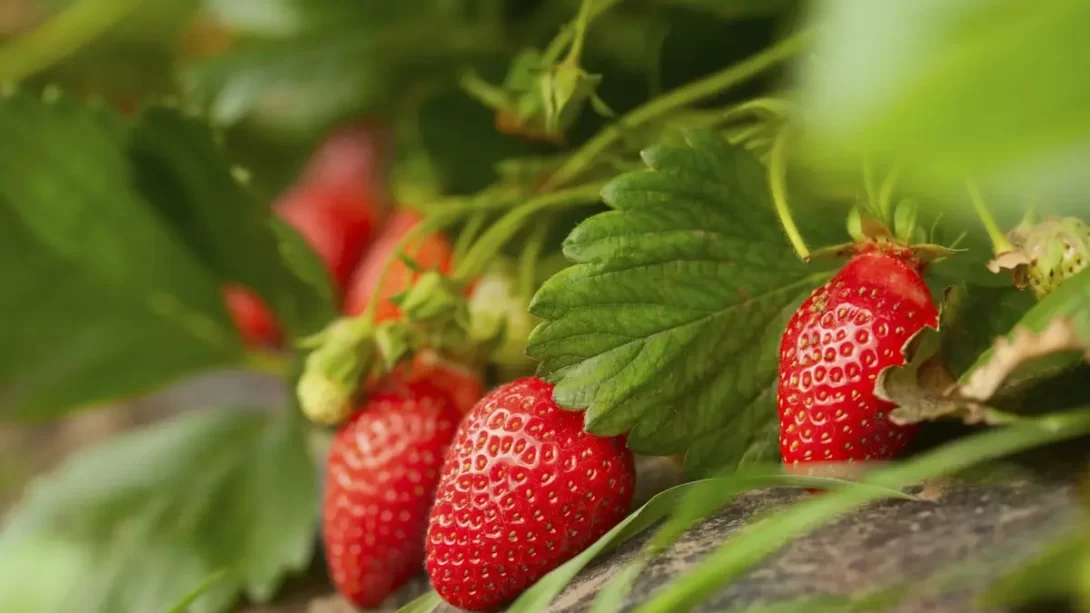Strawberries, with their succulent red berries and sweet aroma, are a favorite in many gardens. However, keeping them off the ground is crucial for healthy growth and a bountiful harvest. When strawberries touch the ground, they are more susceptible to rot, fungal diseases, and pests. This article explores various methods to elevate strawberries, each suitable for different garden spaces and gardening styles. From simple mulching techniques to more complex vertical gardening, these strategies can help ensure your strawberries stay healthy, clean, and ready for picking.
Using Straw Mulch
One of the most traditional and effective ways to keep strawberries off the ground is using straw mulch. Straw mulch acts as a barrier between the fruit and the soil, reducing moisture-related diseases and keeping berries clean. To apply, spread a layer of straw around your strawberry plants, making sure to cover the ground thoroughly while not burying the plants. The straw should be fluffed and loose to allow air circulation. This method not only keeps the fruit off the soil but also helps in maintaining soil moisture and temperature, creating an ideal growing environment for your strawberries.
Implementing a Raised Bed System
Raised bed gardening is another excellent solution for keeping strawberries off the ground. Raised beds improve drainage, reduce soil compaction, and make it easier to manage pests and weeds. To set up a raised bed for strawberries, choose a sunny location and build a frame at least 6-8 inches high. Fill the bed with a mix of high-quality garden soil and compost for rich, well-draining growing conditions. Planting strawberries in raised beds not only elevates the fruit but also makes tending to the plants easier, as you won’t have to bend down as far.
Utilizing Hanging Baskets and Containers
For gardeners with limited space, hanging baskets and containers offer a great way to grow strawberries off the ground. This method not only saves space but also adds an aesthetic appeal to balconies, patios, or decks. When choosing containers, ensure they have adequate drainage holes. Opt for a quality potting mix to fill the containers and plant the strawberries, making sure not to overcrowd them. Hanging baskets and containers also have the added benefit of being mobile, allowing you to move the plants to take advantage of the best sun exposure throughout the day.
Employing Vertical Gardening Techniques
Vertical gardening is an innovative and space-saving approach to grow strawberries off the ground. This method is ideal for small gardens or urban spaces where horizontal space is limited. Vertical gardening involves growing plants in a vertically suspended panel or structure. You can use various DIY vertical gardening structures, such as pallet planters, tower gardens, or wall planters. These systems not only keep the strawberries away from soil contact but also provide an attractive visual element to your garden. When setting up a vertical garden, ensure each plant has enough space to grow and that the structure is stable and receives adequate sunlight.
Installing Support Structures
Support structures like berry hoops, trellises, or pyramid frames are another effective way to elevate strawberries. These structures lift the plants off the ground, providing better air circulation and reducing the risk of disease and pest infestations. To install these, place the support structure around or within your strawberry patch and gently guide the plants to grow through or around it. Ensure that the structure is secure and sturdy enough to support the weight of the plants as they grow. This method not only aids in keeping the fruit clean but also makes harvesting easier.
Choosing the Right Varieties for Elevation
When growing strawberries off the ground, selecting the right varieties can make a significant difference. Some strawberry varieties, especially those with more vigorous and sprawling growth habits, are better suited for elevated systems like hanging baskets or vertical gardens. Day-neutral and everbearing varieties, for instance, typically do well in containers and raised beds. Research and choose varieties that are known for their adaptability to the growing method you’ve chosen. Your local nursery or extension service can be a great resource for recommendations based on your specific climate and space conditions.
Regular Maintenance and Care
Proper maintenance is key to the success of growing strawberries off the ground. Regardless of the method you choose, regular care is essential to ensure healthy, productive plants. First, consistent watering is crucial, as container and elevated plants can dry out more quickly than ground-planted ones. However, avoid overwatering, as strawberries are prone to root rot in soggy conditions. Check the soil moisture regularly, aiming to keep it evenly moist.
Pruning is another important aspect of care. Remove any dead or diseased leaves and trim runners, unless you want them to root for new plants. This encourages the plant to focus its energy on fruit production. Fertilizing is also beneficial; use a balanced, all-purpose fertilizer, ideally one that’s lower in nitrogen to discourage leafy growth at the expense of fruit.
Tips for Pest Control and Disease Prevention
Elevating strawberries can help reduce pest and disease problems, but it’s not a foolproof solution. Keep an eye out for common strawberry pests like slugs, snails, and aphids. Use organic pest control methods like neem oil, insecticidal soaps, or even introduce beneficial insects like ladybugs. For disease prevention, ensure good air circulation around the plants and avoid wetting the foliage when watering. If you notice any signs of disease, such as powdery mildew or leaf spot, treat the plants promptly with appropriate fungicides.
Conclusion
Keeping strawberries off the ground is an effective way to reduce the risk of disease and pest infestations, leading to healthier plants and a more abundant harvest. Whether you opt for mulching, raised beds, hanging baskets, vertical gardening, or support structures, each method offers unique benefits and can be tailored to fit your garden space and style. Regular maintenance, including proper watering, pruning, and pest control, will further ensure the success of your elevated strawberry plants. Experiment with these different methods to find what works best for you, and enjoy the sweet rewards of your homegrown strawberries.



